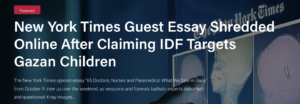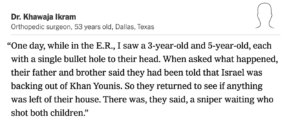The New York Times recently defended its guest essay, in which 65 medical professionals recounted their experiences working in Gaza.
The essay included graphic accounts suggesting that the IDF deliberately targets civilians, including women and children. It also featured X-ray images that were later scrutinized by medical experts for inconsistencies, casting doubt on their authenticity.

Six days after publication, amid growing questions about the credibility of these accounts and the evidence provided, The New York Times issued a statement asserting that the essay had been “rigorously edited” and standing by the contributors’ credentials. The statement further insisted, “Any implication that its images are fabricated is simply false.”
Despite this defense, more evidence soon surfaced, challenging the essay’s claims. In The Jurist, two physicians and medical ethicists described allegations that Israeli forces intentionally targeted children’s heads in Gaza as “highly implausible,” citing ballistic evidence, medical imaging analysis, and the realities of combat. They emphasized the ethical imperative for healthcare workers to provide impartial, fact-based accounts in conflict zones.
In addition to concerns about the X-rays, HonestReporting can now reveal inconsistencies in at least one of the accounts given by a doctor featured in the essay.
Dr. Khawaja Ikram, an orthopedic surgeon from Dallas, Texas, describes treating two children, aged three and five, who he alleges were shot in the head by an Israeli sniper as they returned with their father to survey their home in Khan Younis:

However, this is not the first time Ikram has spoken to a media outlet about his experience in Gaza.
In a February interview with NBC Dallas-Fort Worth, more than six months before the New York Times essay, Ikram recounted a strikingly similar story—though with several key differences. He described treating a man who arrived at the hospital carrying his five-year-old daughter, claiming she had sustained a “single bullet wound to the head.” According to Ikram, the father said, “We thought the troops were pulling back, so we went to check on our home. There were snipers waiting. My five-year-old daughter was shot. She’s my only daughter, please save her.”

The narrative is nearly identical to the one Ikram later gave to The New York Times, but in his earlier account, no mention was made of the additional three-year-old child who was allegedly shot. If his later testimony is accurate, we must ask why this significant detail was omitted in the earlier interview.
Despite The New York Times’ vigorous defense of the essay, mounting evidence continues to discredit both the accounts and the purported evidence within the piece.
It raises serious questions about how thoroughly The Times vetted the doctors involved. Did they even check if these individuals had shared their stories before, and whether there were discrepancies in the details?
As the credibility of the 65 doctors’ essay unravels, The New York Times cannot continue to ignore the cracks.
Liked this article? Follow HonestReporting on Twitter, Facebook, Instagram and TikTok to see even more posts and videos debunking news bias and smears, as well as other content explaining what’s really going on in Israel and the region. Get updates direct to your phone. Join our WhatsApp and Telegram channels!


